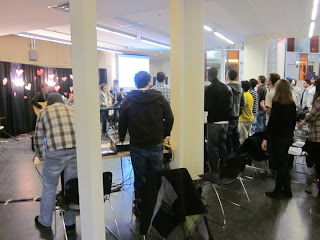 |
| Monday Night @ Embassy Humber |
Back to the present. Humber is a big institution. The Embassy, through the commitment and effort of its students, has found considerable favour with the institution. They are able to meet in the commons area which allows them visibility and accessibility. At present, they are meeting right near the cafeterias and across the commons from where they met in the fall. It allows them to have a sense of relative privacy, while being open and easily accessible.
I took the opportunity to talk about “living for eternity now”. Specifically, I talked about what I have learned since 12/11, the day Dave died. Far from focusing on death, my questions revolve around:
What does it mean to truly live the life we have been created and called to live?
How can we live meaningfully without a vision of The Bigger Picture?
What’s preventing us from Living “ All In and All Out” both of which Dave did in spades.
Again, it was moving to see how his life and words had a way of focusing us all on what it really important. They point us to Jesus – who embodies all that is truly Real.
I must confess, though. In looking back, I realize that there was what I could only describe as a spiritual battle taking place before and after. I wasn’t as much aware of it when I was actually in the middle of it, but more so when I had a couple of days to think about it all. I take that part of the biblical cosmology seriously, with the proviso that it receives no more ( or less) than its proper due. Given all of that, I count it all privilege and joy.
It is really encouraging to see what God is doing in and through The Embassy.








